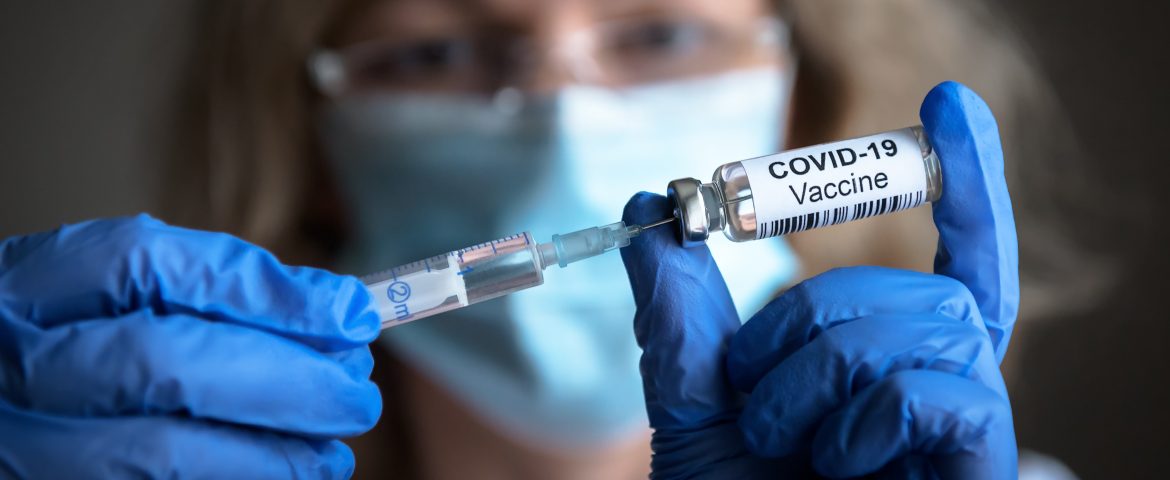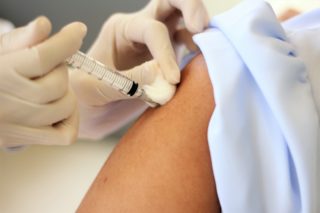The Pfizer vaccine for COVID-19, named Comirnaty, received full approval from the U.S. Food and Drug Administration on August 23, 2021. Moderna received emergency use authorization in December 2020 from the U.S. Food and Drug Administration (FDA) to immunize people against the COVID-19 virus, and a third vaccine from Johnson & Johnson was given emergency use authorization in late February 2021. On May 10, 2021, the FDA expanded the use of the Pfizer vaccine for individuals ages 12-15. It was also recently approved for children ages 5 to 11. These vaccines have been proven to be safe and effective for preventing COVID-19 infections and serious symptoms/hospitalizations. State and local health departments are working diligently with health care systems to distribute the vaccines to all eligible Michigan residents.
Here are some frequently asked questions and answers about the vaccines.
Will the COVID-19 vaccine prevent me from getting the virus?
Data from the vaccine trials show that each vaccine can effectively reduce a person’s chances of contracting COVID-19, which can also help protect those around you. The vaccines also help prevent more serious symptoms of the virus that require hospitalization.
Should I get vaccinated for COVID-19?
It’s recommended that all adults ages 18 and up get vaccinated for COVID-19 once a vaccine is available to them, as well as children ages 5 and up. The Pfizer vaccine is available to those ages 5 and up. The quickest way to achieve herd immunity and return to a more normal daily life is for the majority of the population to get vaccinated. If you have concerns about receiving the vaccine, talk to your primary care provider.
Will more than one dose of the vaccine be required?
The Johnson & Johnson vaccine only requires one dose. The Pfizer and Moderna vaccines require two doses. The Pfizer vaccine requires the second dose to be given 21 days after the first, and the Moderna vaccine requires the second dose to be given 28 days after the first. When you receive your first dose, you will receive a reminder card with the date of your second appointment.
For your safety, experts recommend that you do not share a photo of your vaccination card on social media after receiving your vaccine, as these cards contain personal information such as your birthdate and vaccination location. Many vaccine clinics now have photo backdrops set up along with stickers for you to show and share you are vaccinated as an alternative to sharing an image of your card. If you do share a photo of your card, experts recommend blacking out or covering up your personal information before posting.
Do I need a booster shot?
The CDC recommends that most people get a booster shot following their initial COVID-19 vaccine booster. The current booster recommendations by vaccine are:
- Pfizer-BioNTech: Everyone 12 years and older should receive a booster shot five months after completing their primary vaccine series.
- Moderna: Adults 18 and older should receive a booster shot five months after completing their primary vaccine series.
- Johnson & Johnson’s Janssen: Adults 18 and older should receive a booster two months after their vaccination.
For additional information about boosters, visit the CDC’s website.
Do I need to get a vaccine if I already had COVID-19?
Yes. There is not currently enough information detailing how long someone is protected from getting re-infected after having COVID-19. Getting vaccinated is the best way to protect yourself and others.
Can I get the COVID-19 vaccine if I currently have COVID-19?
No. People with COVID-19 who have symptoms should wait to be vaccinated until they have recovered from their illness and have met the criteria for discontinuing isolation; those without symptoms should also wait until they meet the criteria before getting vaccinated. This guidance also applies to people who get COVID-19 before getting their second dose of vaccine.
Are the COVID-19 vaccines safe?
Yes. The vaccines currently in use went through the same testing and approval process that has been used for decades to safely develop vaccines. Pfizer’s Comirnaty has received full FDA approval. Moderna and Johnson & Johnson received emergency approval from the FDA having met standards of safety and effectiveness. The Pfizer vaccine is approved for all people ages 5 and older, and the Moderna and Johnson & Johnson vaccines are approved for adults 18 and older.
The FDA and CDC recommended a pause to the Johnson & Johnson vaccine distribution on April 13, 2021 due to reports of an extremely rare but severe type of blood clot. COVID-19 vaccine safety is a top priority for the federal government and all reports of health problems following COVID-19 vaccination are taken very seriously.
Following a thorough safety review, the FDA and CDC announced April 23 that the recommended pause regarding the use of the Johnson & Johnson (Janssen) COVID-19 Vaccine in the U.S. should be lifted and use of the vaccine should resume. People who have received the Johnson & Johnson vaccine who develop severe headache, abdominal pain, leg pain or shortness of breath within three weeks after vaccination should contact their health care provider.
Is it safe to get the vaccine if you are pregnant?
The CDC has recommended that women who are pregnant or are trying to become pregnant should get the vaccine when it is available to them, after confirming with their primary care provider.
Can I get the vaccine if I have other medical conditions?
People with underlying medical conditions can receive a COVID-19 vaccine as long as they have not had an immediate or severe allergic reaction to a COVID-19 vaccine or to any of the ingredients in the vaccine. Learn more about vaccination considerations for people with underlying medical conditions. Vaccination is an important consideration for adults of any age with certain underlying medical conditions because they are at increased risk for severe illness from COVID-19. As with any vaccine or treatment, check with your primary care provider about any concerns.
How was the vaccine developed so quickly?
Scientists had already begun to research coronavirus vaccines after previous outbreaks of related coronaviruses (prior to COVID-19). This early research provided a head start when beginning the rapid development of the COVID-19 vaccine. The vaccination development process was modified to allow the COVID-19 vaccine research to progress more quickly without sacrificing safety, and no steps were skipped. See more information about the modifications made to the development process here.
How does the vaccine work?
The COVID-19 vaccines are mRNA vaccines. To create these vaccines, scientists take part of the unique genetic code of the virus (in this case SARS-CoV-2, the virus that causes COVID-19), called messenger RNA, and coat them in a lipid so they can enter a body’s cell. This is injected into the patient. Once the mRNA is within the patient, it instructs the patient’s cells to begin making a specific part of the SARS-CoV-2 virus, called the spike protein. The patient’s immune system then begins to produce antibodies and activate T cells to destroy the spike proteins. Then, if the patient is exposed to the virus in the future, their body recognizes it and has the antibodies and T cells ready to destroy the spike proteins and keep you from getting sick. You can learn more about the science behind how mRNA vaccines work here.
Will the vaccine give me COVID-19?
No. The vaccine gives your body part of the SARS-CoV-2 code so that your body can recognize COVID-19 and fight it in the future.
Does the vaccine have side effects?
Like many vaccines, the COVID-19 vaccines can cause side effects that may last for a few days. You may experience redness or soreness at the injection site, flu-like symptoms, low grade fever, headache, or just a general feeling of not quite yourself. These are signs that your body is doing exactly what it should to protect you from the virus, and the symptoms should subside after a few days.
Can I choose which vaccine I want?
You should get any COVID-19 vaccine that is available. Do not wait for a specific brand. All currently authorized and recommended COVID-19 vaccines are safe and effective, and the CDC does not recommend one vaccine over another.
When can I get vaccinated?
Vaccines are widely available. Everyone 5 years and older who is able to be vaccinated is recommended to do so as soon as possible.
Is there a cost to get vaccinated?
No fees are being charged to get vaccinated. Vaccine providers may charge an administration fee for the vaccine, which would be covered by the recipient’s health insurance company or, if they are uninsured, the Health Resources and Services Administration’s Provider Relief Fund. Check with your health plan provider about what is covered for COVID-19 vaccine administration.
Do I still need to wear a mask after getting vaccinated?
Due to high transmission rates across the country, it is recommended that everyone where a mask when indoors regardless of vaccination status, though in many places it is not required. Additional CDC recommendations for how to proceed after vaccination can be found at here.
What personal information about me will be collected if I get the vaccine?
Your name, address and the vaccine given are required to be reported to the Michigan Care Improvement Registry (MCIR). Health care providers and local health departments who have signed the MCIR Usage Agreement that protects this information can view a person’s record to see what vaccines they have received. Michigan will also share vaccination information with the CDC, but this will not contain personal identifiers such as names and addresses.
How long does the vaccine last?
Experts don’t know how long protection lasts for those who are vaccinated. What they do know is that COVID-19 has caused very serious illness and death for a lot of people. If you get COVID-19, you also risk giving it to loved ones who may get very sick. Getting a COVID-19 vaccine is a safer choice. Experts are working to learn more about both natural immunity and vaccine-induced immunity.
Getting vaccinated once you are able can help stop the spread of COVID-19, save lives, help businesses reopen, and get closer to returning to gathering in larger groups and doing other pre-COVID activities. If you have any concerns about whether or not you should get the vaccine, connect with your primary care provider. More information can be found through the State of Michigan and the CDC.



